
1863 Greece: Seventeen-year-old Danish Prince Vilhelm arrives in Athens to become George I, King of Greece. [For further information, click here]
1864 The Peace of Vienna—under which Denmark cedes Schleswig, Holstein and Lauenburg to Prussia—is signed.
1882 William F. Halsey Jr.: American naval commander:

William Frederick Halsey, Jr., byname Bull Halsey . . . U.S. naval commander who led vigorous campaigns in the Pacific theatre during World War II. He was a leading exponent of warfare using carrier-based aircraft and became known for his daring tactics.
A graduate of the U.S. Naval Academy at Annapolis, Md., in 1904, Halsey served as a destroyer commander in World War I. He became a naval aviator in 1935 and reached the rank of vice admiral in 1940. After the Japanese attack on Pearl Harbor (December 1941), Halsey’s task force was virtually the only operational battle group left in the Pacific. While the United States rebuilt its fleet, he directed surprise forays on Japanese-held islands in the Marshalls and Gilberts as well as on Wake Island. In April 1942 his group maneuvered close enough to Tokyo for Lieutenant Colonel James Doolittle’s planes to carry out the first bombing of the Japanese capital. Consistent successes led to his appointment in October 1942 as commander of the South Pacific force and area. During the next two months, he played a vital role in the Battle of Santa Cruz Islands and the naval Battle of Guadalcanal (November 12–15) and was promoted to admiral. From 1942 to mid-1944 Halsey directed the U.S. campaign in the Solomon Islands.
In June 1944 Halsey became commander of the 3rd Fleet and led his carrier task force in brilliant air strikes. He was responsible for covering and supporting U.S. land operations as well as finding and destroying much of the Japanese fleet in the Battle of Leyte Gulf (October). He led U.S. forces in the final naval operations around Okinawa in the Ryukyu Islands from May 28, 1945, to September 2, when the Japanese surrendered. [For further information, click here.]
1885 Birth: Ezra Pound:
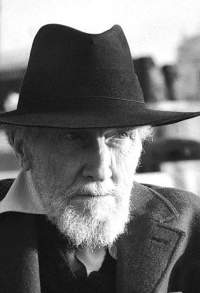
Poet Ezra Pound was born on October 30, 1885, in Hailey, Idaho. He studied literature and languages in college and in 1908 left for Europe, where he published several successful books of poetry. Pound advanced a "modern" movement in English and American literature. His pro-Fascist broadcasts in Italy during World War II led to his arrest and confinement until 1958. [For further information, click here]
1895 Birth: Gerhard Domagk: German bacteriologist and pathologist who was awarded the 1939 Nobel Prize for Physiology or Medicine for his discovery (announced in 1932) of the antibacterial effects of Prontosil, the first of the sulfonamide drugs. This prize was awarded despite the fact that the Nazi government intervened and informed the Nobel awarding committee in Sweden that the prize was not wanted. (Hitler had been enraged with the committee's award of the Peace Prize to a German in a concentration camp.) Domagk was arrested twice at gunpoint by his government, interrogated and imprisoned. He then refused to accept the prize, the first refusal in the history of the awards. After the fall of Hitler, in 1947, was able to go to Stockholm and accept the prize.
1914 Various:
World War I: The Allied offensive at Ieperen, begins.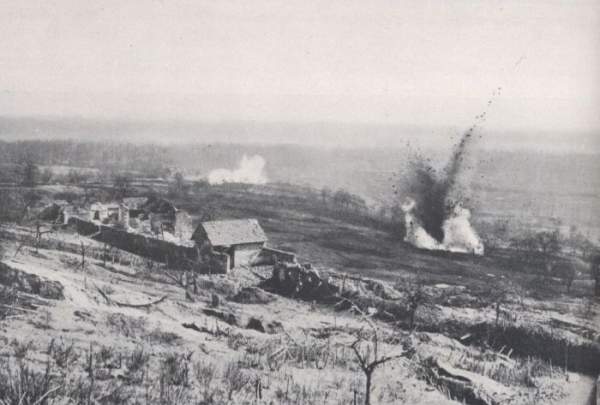
List Regiment (Oct 29-31): Infantry Recruit Adolf Hitler's 1st Company, 16th Bavarian Reserve Infantry, temporarily attached to the 54th Reserve Division, The men see their first action on the Yser this day, when they are sent forward to relieve a hard-pressed unit. With English and Belgian shells falling all around, Hitler's company advances and retreats four times before eventually taking their assigned objective. The battle continues for three days, with fierce causalities on both sides. [For further details, Click here.]

1915 World War I (Oct 4, 1915 - Feb 29, 1916): Gefreiter Adolf Hitler's serves with 16 Reserve Infantry Regiment at Fromelles. [For further details, Click here.]
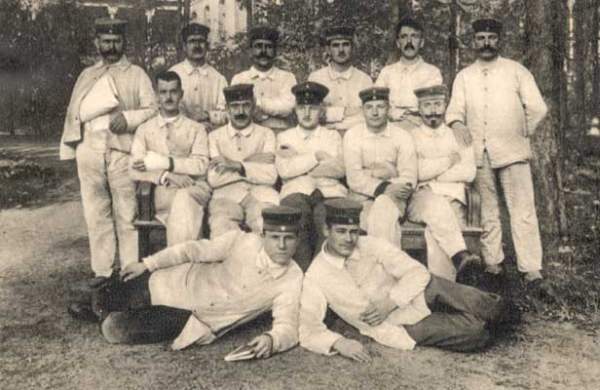
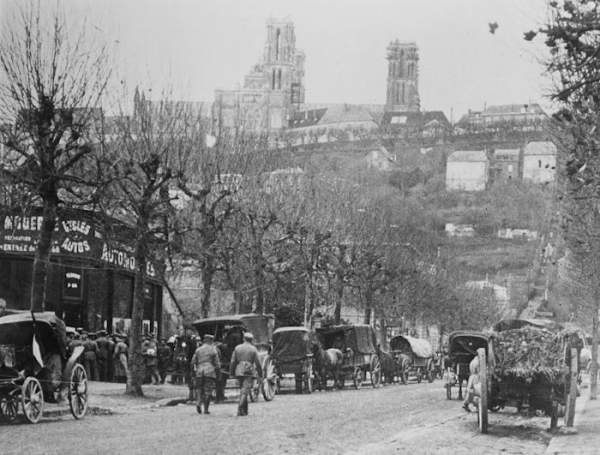
1918 World War I: Various:
Italy: British and French advances against the Austrians reach Sacile.
Ottoman Empire signs treaty with Allies:
On October 30, 1918, aboard the British battleship Agamemnon, anchored in the port of Mudros on the Aegean island of Lemnos, representatives of Great Britain and the Ottoman Empire sign an armistice treaty marking the end of Ottoman participation in the First World War.
Though the Ottoman Empire—in a period of relative decline since the late 16th century—had initially aimed to stay neutral in World War I, it soon concluded an alliance with Germany and entered the war on the side of the Central Powers in October 1914. The Turks fought fiercely and successfully defended the Gallipoli Peninsula against a massive Allied invasion in 1915-1916, but by 1918 defeat by invading British and Russian forces and an Arab revolt had combined to destroy the Ottoman economy and devastate its land, leaving some six million people dead and millions more starving.
As early as the first week of October 1918, both the Ottoman government and several individual Turkish leaders contacted the Allies to feel out peace possibilities. Britain, whose forces then occupied much of the Ottoman territories, was loath to step aside for its allies, particularly France, which according to an agreement concluded in 1916 would take control of the Syrian coast and much of modern-day Lebanon. In a move that enraged his French counterpart, Georges Clemenceau, Prime Minister David Lloyd George and his cabinet authorized Admiral Arthur Calthorpe, Britain’s naval commander in the Aegean Sea, to negotiate an immediate armistice with Turkey without consulting France. Though Britain alone would engineer the Ottoman exit from the war, the two powerful Allies would continue to grapple over control in the region at the Paris Peace Conference, and for years beyond.
Negotiations between Calthorpe’s team and the delegation from Constantinople, led by the Ottoman Minister of Marine Affairs Rauf Bey, began at 9:30 on the morning of October 30, 1918, aboard the Agamemnon. The Treaty of Mudros, signed that evening, stated that hostilities would end at noon the following day. By its terms, Turkey had to open the Dardanelle and Bosporus straits to Allied warships and its forts to military occupation; it was also to demobilize its army, release all prisoners of war and evacuate its Arab provinces, the majority of which were already under Allied control. Bey and his fellow delegates refused to paint the treaty as an act of surrender for Turkey—later causing disillusionment and anger in Constantinople—but in fact that is what it was. The Treaty of Mudros ended Ottoman participation in World War I and effectively, if not legally, marked the dissolution of a once mighty empire. From its ruins, the victors of the First World War attempted to use the post-war peace negotiations to create a new, more unpredictable entity: the modern Middle East. (History.com)
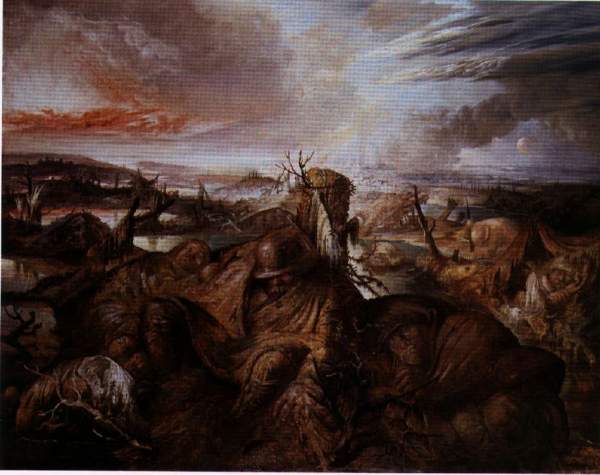
Gefreiter Adolf Hitler: (Oct 15-Nov 10): Blinded in a gas attack near Werwick on Oct 14, Hitler continues to recover in the Prussian Reserve Hospital at Pasewalk near Berlin. The doctors at this army hospital, on the cutting edge of medical treatments for gassed soldiers, provide Hitler with very good care, and his sight slowly and painfully begins to return to him over these few weeks. Hitler falls into a deep depression. After over four years on the front lines, his fighting days are over. In four years of war, the List Regiment has lost 3,754 dead, 8,795 wounded, with 678 taken prisoner. This is somewhat above the average for the German Armed Forces as a whole.
1922 Italy: King Victor Emmanuel III names Benito Mussolini prime minister:
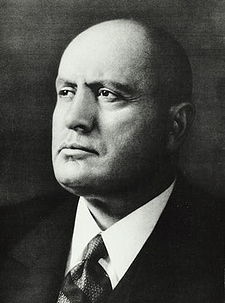
By October 1922, Italy seemed to be slipping into political chaos. The Black Shirts marched on Rome and Mussolini presented himself as the only man capable of restoring order. King Victor Emmanuel invited Mussolini to form a government. Mussolini gradually dismantled the institutions of democratic government and in 1925 made himself dictator, taking the title 'Il Duce'. He set about attempting to re-establish Italy as a great European power. The regime was held together by strong state control and Mussolini's cult of personality. [For further details, Click here.]
1933 Various:
Canada: The anti-Semitic White Shirts movement is founded in Ottawa.
League of Nations: James G. McDonald is appointed High Commissioner for the Relief of Refugees:
The diaries of Mr. McDonald, who served as the high commissioner for refugees for the League of Nations, provide fresh material for what has become a long-simmering debate among historians: Did the Nazis who took power in 1933 have an early intention to annihilate the Jews of Europe? Or was the plan for genocide something that evolved over the years and was impelled by other factors like the German Army's military setbacks in the east? The McDonald diaries also provide accounts of his entreaties to Cardinal Eugenio Pacelli, then the Vatican's secretary of state, to help Europe's Jews. Cardinal Pacelli became Pope Pius XII, and his behavior during the Holocaust years has produced its own emotional debate as the Roman Catholic Church considers his eligibility for sainthood. Mr. McDonald, who spoke German fluently and whose mother was German, toured Germany in April 1933 and reported that a friend of his from Harvard said fellow Nazis were planning the elimination of Jews from Germany. He met on April 3 with the friend, Ernst (Putzi) Hanfstängl. Mr. Hanfstängl was part of Hitler's entourage and was, according to his own writings, enthralled with the Nazi leader. Mr. McDonald records that Mr. Hanfstängl "spoke poetically" of the Nazis. He said that when he told Hitler of an international movement to boycott Germany, Hitler "beat his fists and exclaimed, 'Now we shall show them that we are not afraid of international Jewry. The Jews must be crushed.' " Mr. Hanfstängl then spoke of plans to assign a storm trooper to each Jew. Five days later, Mr. McDonald met with Hitler in his office and got a softer view. Hitler said he was not making war on Jews as such, but on Communists and Socialists. Like many who met Hitler in that period, Mr. McDonald noted that he had striking, hypnotic eyes. Weeks after meeting Hitler, Mr. McDonald conferred with Roosevelt in the White House about his views of what was happening in Germany. [For further details, Click here.]
1934 The American Legion adopts a resolution condemning Nazism:
In 1922, before the Fascists had even taken control in Italy, Colonel Alvin Owsley, then the Commander of the Legion, declared that the Legion was poised to fight "Soviets, anarchists, I.W.W.'s, revolutionary socialists and every other 'red'." Owsley invited Mussolini to speak at almost every yearly convention of the Legion. "Do not forget," he said, "that the Fascisti are to Italy what the American Legion is to the United States." This was real Fascism; "What comes nearer true Fascism is this kind of violent anti-labor activity, carried on not by hired strong-arm men or state troopers but by volunteers. [For further details, Click here.]
1937 From a speech by Constantin von Neurath before the Academy of German Law:

In recognition of these elementary facts the Reich Cabinet has always interceded in favor of treating every concrete international problem within the scope of methods especially suited to it, not to complicate it unnecessarily by involvement with other problems; and, as long as problems between only two powers are concerned, to choose the direct way for an immediate understanding between these two powers. We are in a position to state that this method has fully proved itself good not only in the German interest, but also in the general interest.
1938 Holocaust: The sixth ordinance of the Reich Citizenship Act bars all Jews from working as patent agents.
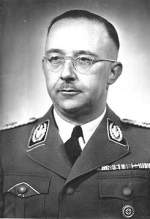
1939 Holocaust: Himmler orders that all Jews must be cleared out of the rural areas of western Poland within 3 months. In the Poznan region, 50 communities are immediately uprooted. (THP)
1941 World War II: Various:

FDR approves Lend-Lease aid to the USSR:
On this day in 1941, President Roosevelt, determined to keep the United States out of the war while helping those allies already mired in it, approves $1 billion in Lend-Lease loans to the Soviet Union. The terms: no interest and repayment did not have to start until five years after the war was over.
The Lend-Lease program was devised by President Roosevelt and passed by Congress on March 11, 1941. Originally, it was meant to aid Great Britain in its war effort against the Germans by giving the chief executive the power to "sell, transfer title to, exchange, lease, lend, or otherwise dispose of" any military resources the president deemed ultimately in the interest of the defense of the United States. The reasoning was: If a neighbor was successful in defending his home, the security of your home was enhanced.
Although the Soviet Union had already been the recipient of American military weapons, and now had been promised $1 billion in financial aid, formal approval to extend the Lend-Lease program to the USSR had to be given by Congress. Anticommunist feeling meant much heated debate, but Congress finally gave its approval to the extension on November 7.
By the end of the war, more than $50 billion in funds, weapons, aircraft, and ships had been distributed to 44 countries. After the war, the Lend-Lease program morphed into the Marshall Plan, which allocated funds for the revitalization of "friendly" democratic nations�"even if they were former enemies. (History.com)
Barbarossa: The German offensive toward Moscow is halted until winter permanently hardens the ground, restoring mobility to the German tank forces.
Church and Reich: Bishop Wienken informs Bishop Hilfrich of Limburg that negotiations concerning the deportations of Catholic "non-Aryans" have been started at the highest levels.
The leaders of the Catholic Church could not fail to see that the First World War had been a highly damaging catastrophe for all the churches. The outburst of rival nationalisms, the mutually exclusive claims to have divine approval for their war aims, the seemingly endless casualties and the rapid decline of personal and public morality, were all grave indications of a world-wide moral disorder. The Vatican therefore saw its prime duty to seek to restore peace between and within the nations, to use its influence to stabilize the postwar regimes, to reconcile the former enemies and to heal the wounds of war. Its resources for this vast task were, however, pitifully limited. [For further details, Click here.]
Holocaust: From a report from the Commissioner General of Sluzk to the Commissioner General of Minsk:
On 27 October, in the morning at about 8 o'clock, a first lieutenant of the Police Battalion Number 11, from Kovno, Lithuania, appeared and introduced himself as the adjutant of the battalion commander of the Security Police. The first lieutenant explained that the police battalion had received the assignment to effect the liquidation of all Jews here in the town of Sluzk within 2 days. The battalion commander with his battalion in strength of four companies, two of which were made up of Lithuanian partisans, was on the march here and the action would have to begin instantly. I replied to the first lieutenant that I had to discuss the action in any case first with the commander. About half an hour later the police battalion arrived in Sluzk. Immediately after the arrival a conference with the battalion commander took place according to my request. I first explained to the commander that it would not very well be possible to effect the action without previous preparation, because everybody had been sent to work and that it would lead to terrible confusion. At least it would have been his duty to inform me a day ahead of time. Then I requested him to postpone the action 1 day. However, he refused this with the remark that he had to carry out this action everywhere in all towns and that only 2 days were allotted for Sluzk. Within those 2 days the town of Sluzk had by all means to be cleared of Jews. For the rest, as regards the execution of the action, I must point out, to my deepest regret, that the latter almost bordered on sadism. The town itself during the action offered a picture of horror. With indescribable brutality on the part both of the German police officers and particularly of the Lithuanian partisans, the Jewish people, and also with them White Ruthenians, were taken out of their dwellings and herded together. Everywhere in the town shots were to be heard, and in different streets the corpses of Jews who had been shot accumulated. The White Ruthenians were in the greatest anguish to free themselves from the encirclement. In addition to the fact that the Jewish people, among whom were also artisans, were barbarously maltreated in sight of the White Ruthenian people, the White Ruthenians themselves were also beaten with clubs and riflebutts. It was no longer a question of an action against the Jews. It looked much more like a revolution . . . .
In conclusion, I find myself obliged to point out that the police battalion looted in an unheard-of manner during the action and that not only in Jewish houses but equally in those of the White Ruthenians. Anything of use, such as boots, leather, cloth, gold and other valuables, was taken away. According to statements of the troops, watches were torn off the arms of Jews openly on the street and rings pulled off their fingers in the most brutal manner. A disbursing officer reported that a Jewish girl was asked by the police to obtain immediately 5,000 rubles to have her father released. This girl is said actually to have run about everywhere to obtain the money . . . .
I am submitting this report in duplicate so that one copy may be forwarded to the Reich Minister. Peace and order cannot be maintained in White Ruthenia with methods of that sort. To have buried alive seriously wounded people, who then worked their way out of their graves again, is such extreme beastliness that this incident as such must be reported to the Fuehrer and the Reich Marshal. The civil administration of White Ruthenia makes every effort to win the population over to Germany, in accordance with the instructions of the Fuehrer. These efforts cannot be brought into harmony with the methods described here.
The US destroyer Reuben James—on convoy duty off Iceland, is sunk by a German U-boat: she sailed from Argentia, Newfoundland on 23 October 1941, with four other destroyers to escort eastbound convoy HX-156. While escorting that convoy at about 0525, 31 October 1941, Reuben James was torpedoed by German submarine U 552 near Iceland. Reuben James had positioned herself between an ammunition ship in the convoy and the known position of a "wolfpack." Reuben James was hit forward by a torpedo and her entire bow was blown off when a magazine exploded. The bow sank immediately. The aft section floated for five minutes before going down. Of the crew, 44 survived and 100 died. [For further details, Click here.]
1942 World War II: Hitler departs Vinnitsa.
1944 Various:
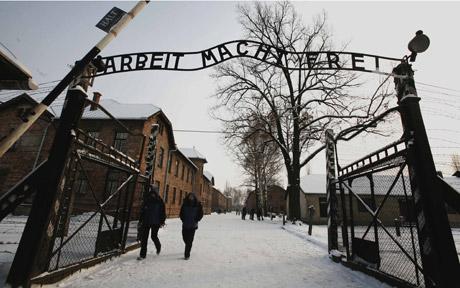
Holocaust: The last transport of Jews from Theresienstadt arrive at Auschwitz; on this day and the next, 1,689 of will be sent to the gas chambers. (THP)
Beginning in 1942, SS authorities deported Jews from Theresienstadt to other ghettos, concentration camps, and extermination camps in Nazi-occupied eastern Europe. German authorities either murdered the Jews upon their arrival in the ghettos of Riga, Warsaw, Lodz, Minsk, and Bialystok, or deported them further to extermination camps. Transports also left Theresienstadt directly for the extermination camps of Auschwitz, Majdanek, and Treblinka. In the ghetto itself, tens of thousands of people died. [For further details, Click here.]
Goering:
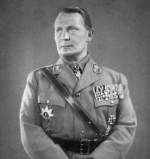
Dressed in "bright red, soft morocco leather riding boots with silver spurs . . . wearing an amply cut thick fur coat of Australian opossum, the fur outwards," according to the account of the rocket sites commander, General Dornberger, Goering visits Peenemuende to view the latest anti-aircraft rockets: "He pretended to be studying the drawings on the walls, but he was no longer looking at them. He was totally disinterested . . . . About every five minutes his eyes started to turn until one could only see the whites. He staggered, reached into the pocket of his coat, and swallowed a small, round, rose red pill. Instantly, he straightened and appeared to be quite normal again. After five minutes, the same process . . . . When he climbed the stairs to the roof of the small tracking building of the "waterfall" project, he pulled a heavy revolver out of its holster, threw it up in the air several times and caught it again. His adjutant took the weapon away from him with the remark that it was loaded and not on safety." (Read)
[See: Wunderwaffen: Hitler's Deception and the History of Rocketry.]1953 Various
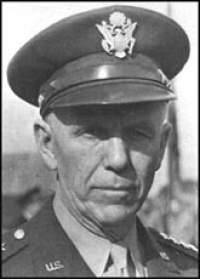
George C. Marshall, who, as secretary of state following World War II, engineered a massive economic aid program for Europe, was awarded the Nobel Peace Prize.
Cold War: Eisenhower approves NSC 162/2:

On October 30, 1953, President Dwight D. Eisenhower formally approves National Security Council Paper No. 162/2 (NSC 162/2). The top secret document made clear that America's nuclear arsenal must be maintained and expanded to meet the communist threat. It also made clear the connection between military spending and a sound American economy. [For further details, Click here.]
1961 Arms Race: The Soviet Union tests a hydrogen bomb.
1975 Juan Carlos assumes power in Spain:

Prince Juan Carlos becomes Spain's acting head of state after General Francisco Franco, the dictator of Spain since 1936, concedes that he is too ill too govern. The 83-year-old dictator had been suffering serious health problems for nearly a year. Three weeks after Juan Carlos assumed power, Franco died of a heart attack. Two days later, on November 22, Juan Carlos was crowned king. [For further details, Click here.]
2014 Washington DC: Churchill Bust Dedicated in Statuary Hall:
Amid the grandeur of the United States Capitol Building's Statuary Hall a standing-room only crowd witnessed the ceremony dedicating a bust of Winston Churchill donated to the nation by The Churchill Centre. Speaker of the House of Representatives John Boehner accepted the bust with the words, "Winston Spencer Churchill was the best friend the United States ever had." Joining the Speaker were former-Speaker and House Minority Leader Nancy Pelosi, the Majority and Minority Leaders of the Senate and the United States Secretary of State John Kerry. Roger Daltrey, founder and lead singer of The Who, performed "Stand By Me" as a tribute to Sir Winston's legacy and Anglo-American solidarity. [To watch the complete ceremony, click here. For further information, click here].
Edited by Levi Bookin (Copy editor)
levi.bookin@gmail.com



Click to join 3rdReichStudies



Disclaimer: This site includes diverse and controversial materials--such as excerpts from the writings of racists and anti-Semites--so that its readers can learn the nature and extent of hate and anti-Semitic discourse. It is our sincere belief that only the informed citizen can prevail over the ignorance of Racialist "thought." Far from approving these writings, this site condemns racism in all of its forms and manifestations.
Fair Use Notice: This site may contain copyrighted material the use of which has not always been specifically authorized by the copyright owner. We are making such material available in our efforts to advance understanding of historical, political, human rights, economic, democracy, scientific, environmental, and social justice issues, etc. We believe this constitutes a "fair use" of any such copyrighted material as provided for in section 107 of the US Copyright Law. In accordance with Title 17 U.S.C. Section 107, the material on this site is distributed without profit to those who have expressed a prior interest in receiving the included information for research and educational purposes. If you wish to use copyrighted material from this site for purposes of your own that go beyond 'fair use', you must obtain permission from the copyright owner.
Please Note: The list-owner and the moderator of 3rdReichStudies are not responsible for, and do not necessarily approve of, the random ads placed on our pages by our web server. They are the unfortunate price one pays for a 'free' website.